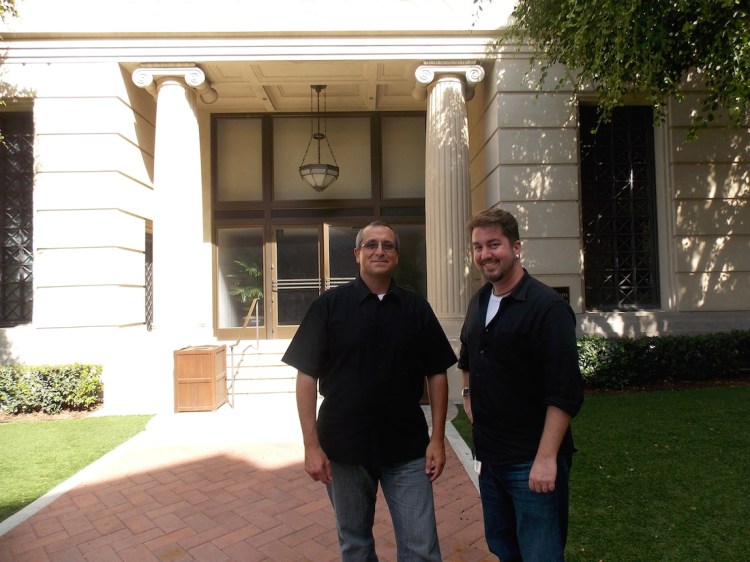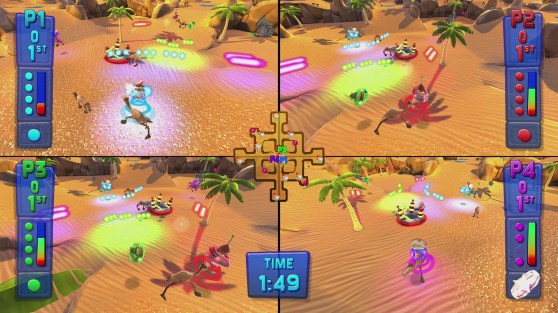You can see a lot of familiar things on the Sony Pictures lot in Culver City, Calif. A giant poster for Lawrence of Arabia greets you when you walk through the Madison Avenue entrance. Walter White’s RV-turned-mobile-meth-lab from Breaking Bad is on display near the Ghostbusters’ Ecto-1. And tucked away in the historic Capra building is a video game developer.
Wait, what?
Unlike most Sony-owned studios, the aptly named Loot Entertainment doesn’t fall under the Sony Computer Entertainment umbrella, the internal video game division for all things PlayStation. Loot is actually a part of Sony’s media production and services business, the Sony Digital Audio Disc Corporation (DADC). While the DADC is an unusual home for a small cluster of developers who want to make PlayStation games, Loot’s unique situation allows it to maintain its heritage as a multifaceted studio.
Last month, I met with managing director David Sterling and product development manager Jason Sorensen to find out what makes Loot tick, and how it’s shaping up to be another weapon in Sony’s aggressive pursuit of indie games.
Leaving the movie business behind
Loot Entertainment is just the latest incarnation of a Sony subsidiary that has been around since the 1990s. When Sterling joined it in 1998, it was known as the Sony Pictures DVD Center, an R&D group that was working with Sony Japan to help launch the then-nascent DVD platform. After DVD became the go-to media format, the Center continued to work on firmware updates and DVD features. At that time, Sterling says they didn’t have “any aspirations of becoming a real business.”
In 2003, the DVD Center became the Sony Pictures Digital Authoring Center, building on its success as a facility for creating DVDs, UMDs (a proprietary disc used for the PlayStation Portable handheld), and Blu-ray discs for various movie studios.
Five years ago, it decided to diversify its business when details about PlayStation Home, an online-only virtual world for PlayStation 3, emerged. It enables PS3 players to mingle with friends and strangers by using customizable avatars and houses. Home’s social possibilities captivated Sterling and his colleagues. They started playing with the closed beta in 2008.
“I remember the day that someone called me in — I was in an edit bay, and one of our editors goes, ‘Oh you gotta see this!’ I’m like, ‘What is that?’ ‘It’s PlayStation Home.’ ‘Wow, can you do this, can you do that?’ … I was like, ‘We gotta get involved in that; that’s amazing stuff,’” said Sterling. “Some of the stuff that we did for Blu-ray and BD-Live — connecting people that way via smart Blu-ray players — this was just a whole ‘nother leap forward for that.”
To see if working in PlayStation Home would actually make sense, the group assigned a single engineer to make three virtual T-shirts to sell in their digital storefront. When people actually started buying them, Sterling thought that maybe they were on to something. He formed Loot in early 2009 and brought in veteran developers to beef up its video game team.
Loot’s Home catalogue only grew bigger and bigger over the years. It created a number of living spaces based on Sony properties, including the headquarters from Men in Black and the TARDIS from Doctor Who. It developed an on-demand entertainment system that allowed Home users to watch films and videos together in sync while chatting with their headsets. Along the way, Loot also made its first game inside of Home, a silly arcade title called Cabin Boy in Trout Trouble (see the video below). Sterling is so fond of Cabin Boy that he considers it as Loot’s first real console game.
[youtube http://youtu.be/Z9z79rur3I8]Life after Home
Though Loot’s employees are sad about Home’s upcoming closure on March 31, 2015, the company is ready to move on. It started expanding its business beyond virtual goods two and a half years ago when it began making Forsaken Planet, an arcade game where players competed with each other by transforming anything they found into valuable “chikkin” products.
Loot launched an open beta for Forsaken Planet on PC, Android devices, and the Ouya microconsole last year. Sterling says they learned a lot from that experience in terms of how to properly build a game and publish it.
The finished game, however, appeared on a completely different platform (and with a much better name). Forsaken Planet is now known as Fluster Cluck — “The ‘F’ comes first!” Sterling helpfully reminded me when I was on the verge of blurting out the other word — and it came out for PlayStation 4 on Oct. 21. The graphics are better and the premise is slightly different, but otherwise, Fluster Cluck retains the fast-paced action of its predecessor.
In-house development isn’t the only skill Loot is cultivating. The studio is also helping independent developers bring their games to PlayStation consoles. The first game released through its porting services was Mimimi Productions’ The Last Tinker: City of Colors (you can read our review of the PC version here), which came out for PS4 in August 2014.
“I think what we’re looking for are developers that can’t bring their games to the platform for one reason or another. That’s what we found for the games we’re looking at now,” said Sterling. “Developers are resource-strapped in one way or another, and we’re looking for the kind of games that make sense for the platform and fit into our strategy of being able to port them quickly and efficiently.”
“The PS4 is the darling of the ball,” Sorensen added. “There’s a lot of interest in being on that platform. Since we’ve brought a lot of stuff to PlayStation in the past, [porting games is something we can help with].”



